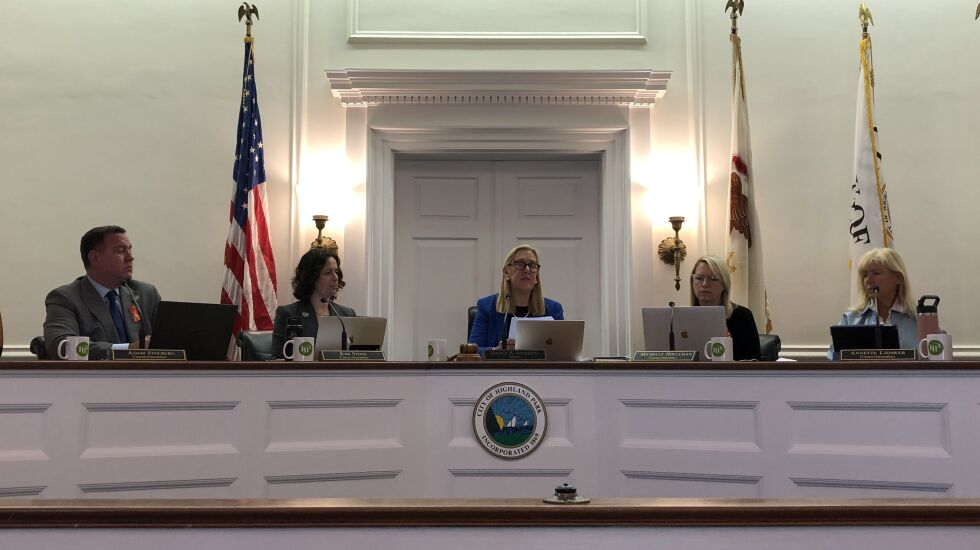
The Highland Park City Council on Monday unanimously approved a resolution urging state and federal bans on assault weapons, high capacity magazines and other actions to curb gun violence, with the move stemming from the July 4 parade massacre where a shooter with an assault rifle killed seven people and wounded 48.
The Highland Park vote came after the Lake County Board, mainly on a party line 16-5 vote on Aug. 9, passed a measure adding to its legislative agenda a call for the state of Illinois and Congress to take action.
The measures from Highland Park and Lake County are advisory — and throws the spotlight on Democrats in Springfield, where they hold a supermajority in the state House and Senate and the governorship.
There is internal debate over whether to bring up legislative proposals before the November election — and expose some Downstate Democrats to a vote they would rather avoid — or wait for the fall veto session, which takes place after the election. The state House needs 71 yes votes to make any bill effective immediately and 60 votes for a 2023 effective date.
In Washington, the prognosis on winning any ban is bleak, since there is no Republican support in the Senate. GOP members of the Senate Judiciary Committee pushed back on Highland Park Mayor Rotering when she called for an assault weapons ban during a July hearing, called by Senate Judiciary Chair Sen. Dick Durbin, D-Ill., in the wake of the slaughter.
Unlike the Lake County Board meeting last week — where debate lasted for hours and there were several attempts to delay the vote for at least a month, and where a representative of the Illinois State Rifle Association and others spoke out against it — the yes votes from the six Highland Park council members came quickly and without discussion, partly because they have been down this route years ago, passing, under Rotering, an assault weapons ban in 2013.
But as Rotering noted in her remarks Monday — repeating the argument she has been making since the massacre — Highland Park is not an island.
A ban in one suburb obviously has little practical impact.
The parade drew attendees from Highland Park and its neighbor, Highwood, and the resolution said “innumerable members of our community suffer and continue to suffer emotional harm and anguish as a result of the July 4 mass shooting.
“...The city is deeply concerned that gun related violence is endemic in our society” and that the weapon used in the July 4 shooting fired “83 rounds into a crowd in under a minute.”
The Highland Park resolution calls for state and federal actions on assault weapons, with a ban on large capacity bullet magazines being called for because it allows, as the resolution noted, a shooter to “fire at large numbers of people without taking time to reload, thereby dramatically increasing the number of lives shattered by gun violence.”
Specifically the Highland Park resolution called for Congress and the state of Illinois to ban the manufacture, purchase, sale, possession and use of all semi-automatic weapons; high capacity ammunition cartridges and body armor, except as needed by military and law enforcement.
A Highwood resident, Robert E. Crimo, 21, is facing a 117-count indictment for the parade massacre and is being held without bond in the Lake County Jail in Waukegan.
There is ongoing concern in Highland Park about how Crimo — who had come to the attention of police and others because of questionable behavior — was not covered by state red flag laws and was allowed to legally buy weapons.
The resolution called for legislation strengthening red flag laws “to better allow law enforcement, family members, employers and school employees to seek restraining orders against an individual suspected of being a clear and present danger to themselves and others.”
Anger against Crimo’s father, Robert, a Highwood resident who once ran for Highland Park mayor, is palatable because he signed papers allowing his son — who already had displayed disturbing behavior — to legally buy weapons when he was 19-years-old.
The resolution seems to address that, stating, “we call for the state of Illinois to enact stricter rules for the issuance of Firearms Owners Identification Cards and we call on the state to more rigorously screen applicants for FOID cards and make more comprehensive use of clear and present danger reporting data.”
State Rep. Bob Morgan, D-Deefield, who represents Highland Park, is the chair of the state House Firearm Safety and Reform Working Group.







